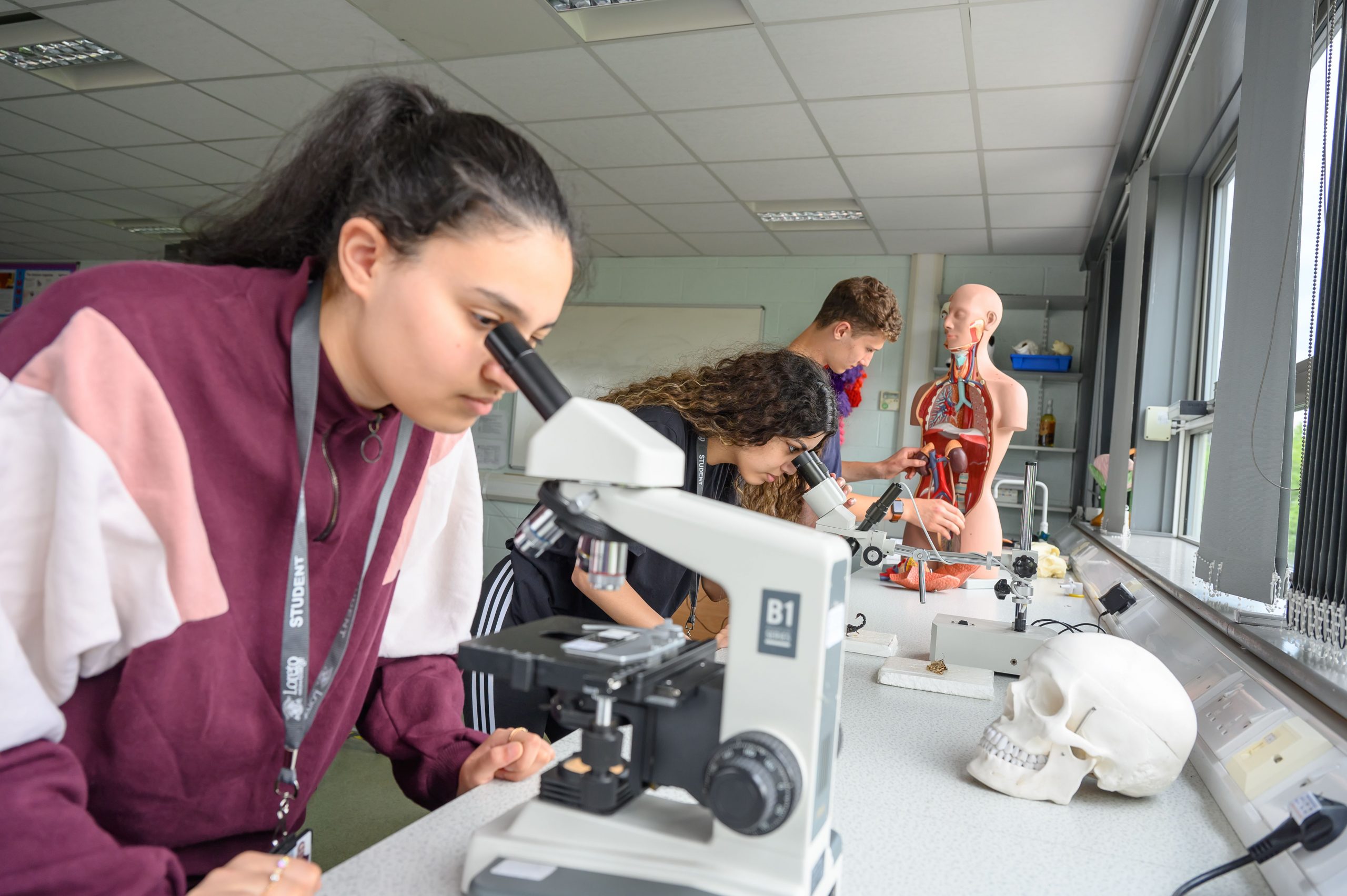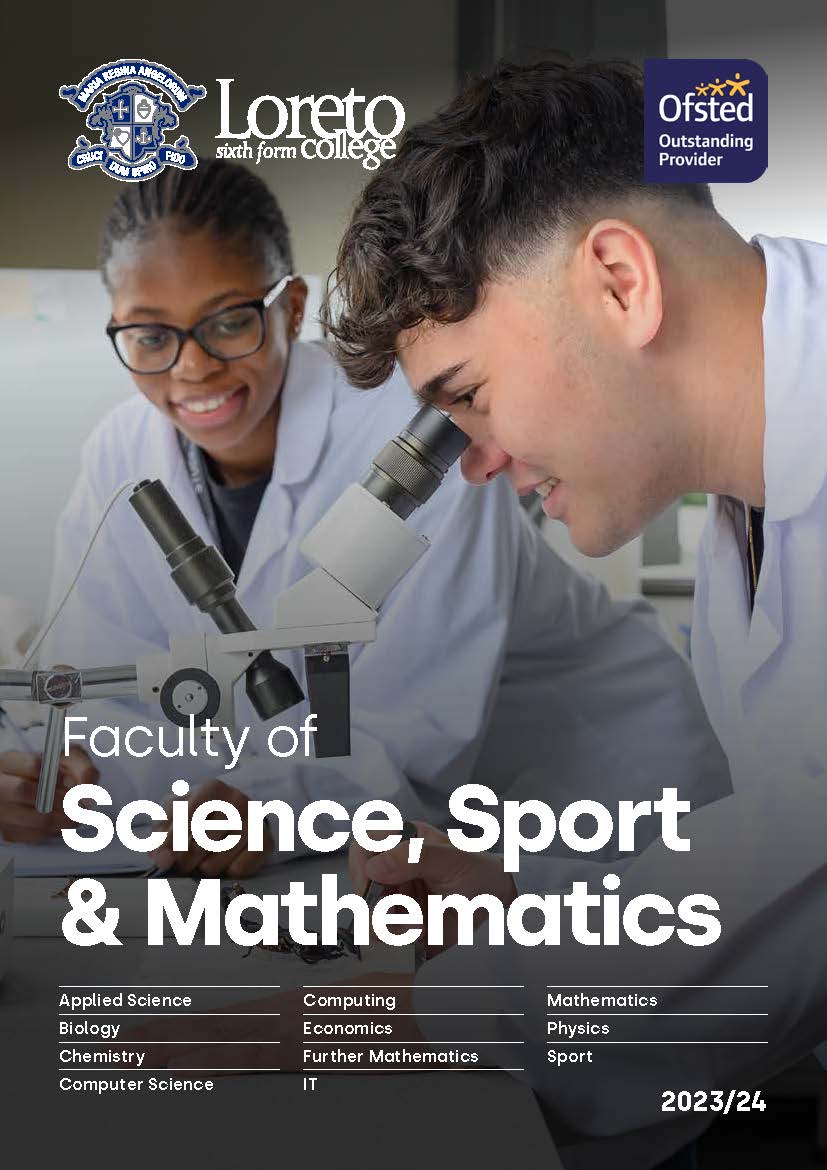Entry Requirements
Click the button to read our faculty brochure or read more about the course below:
- Six GCSEs 9-4 (or A*-C)
- Two from English, Maths OR Science
- Two at least grade 6
Course specific requirements: GCSE Maths (higher tier) grade 9-6 WITH EITHER GCSE Biology grade 9-6 OR GCSE Combined Science grades 9,9-6,6
*To choose more than one subject from Maths, Biology, Chemistry or Physics: (minimum of a grade 7 and 6 in the chosen subjects and one other grade 6 in science/maths).
Additional Information: Students with a GCSE grade 6 in Maths will study Core Maths as an additional subject in their first year to support their Maths skills in Biology

A Level Biology
- Are you fascinated with how the human body works, from the beating of our hearts to the development of an immune response?
- Do you want to know more about the negative impact humans are having on the planet and how we can make positive changes to combat this?
As a biology student you will cover a wide range of exciting topics that extend your understanding of living organisms and the world we live in.
Exam board: EDUQAS
Components
Component 1: energy for life
Percentage of total marks: 33.33%
Method of assessment: Written exam, 2 hours.
This unit looks at respiration, photosynthesis, microbiology, populations, ecosystems and human impact on the environment.
Component 2: continuity of life
Percentage of total marks: 33.33%
Method of assessment: Written exam, 2 hours.
This unit includes biodiversity, cell division, sexual reproduction in animals and plants, inheritance, variation, evolution and applications of reproduction and genetics.
Component 3: requirements for life
Percentage of total marks: 33.33%
Method of assessment: Written exam, 2 hours.
Section A includes adaptions for gas exchange in animals and plants, transport in animals and plants, nutrition, homeostasis and the nervous system (80 marks). Section B is from a choice of three options: immunology and disease, human musculoskeletal anatomy, neurobiology and behaviour (20 marks).
Core Concepts: Basic biochemistry and cell structure will be examined in all three A level components.
Practical Endorsement: This will be evidenced by a minimum of 12 experiments carried out over the two-year course. Practical skills and application will be assessed in written papers (15% of content).
Skills
You will develop your practical skills throughout the two years in order to gain a separate practical endorsement certificate. For this you will complete a minimum of 12 experiments, assessing a variety of lab skills. Additionally, in the exams you will be assessed on practical, application and mathematical skills.
Careers/destinations
Biology students go on to pursue a wide variety of related destinations. These include degree courses in medicine, dentistry, veterinary science, biomedical science, biochemistry, zoology, animal behaviour, marine biology, environmental science, physiotherapy and sports science. Many careers within research, healthcare and conservation are accessible through studying biology.
Biology
What exam board do you study?
EDUQAS. We have worked with EDUQAS for years and always gained very good results well above national average. As a result we are rated as one of the top biology departments in the country. The department has strong links with the exam board and many staff examine for them.
What topics do we study?
We study a wide range of topics. These topics are often similar to GCSE topics but we go into much deeper understanding. Some topics include: enzymes, cells, transport in plants & animals, gas exchange, nervous system, immunology, microbiology, inheritance, cell division, populations and reproduction.
Will we do many practical experiments?
We undertake a large number of practical experiments alongside
teaching. You will be given a separate lab book and we will complete all practical work in this. Some of these experiments include microscope work, dissections, sampling field work and the use of a colorimeter. Practical work will be assessed in your exams and so we will practice practical based exam questions throughout the year. You will also improve your practical skills throughout the year in order to gain a separate practical endorsement pass.
Is there support if I am finding biology challenging?
Yes, we have lots of support available. Our booklets contain all of the theory you need to pass the exam plus lots of hints and tips. We work through exam question booklets throughout the year to help you develop your exam question technique. All theory topics have an online quiz for you to complete at the end of each booklet so that you can check you understand the key concepts. We also have narrated PowerPoint presentations, and online activities to help with understanding. Students are continually encouraged to ask staff for help if they finding biology challenging, both inside or outside of the classroom. If a class teacher is unavailable there will often be another biology teacher available to help as we are such a large department. In the second year we also run support classes alongside normal classes to recap theory and develop exam technique.
Will you be able to challenge me for the best grades?
Yes! We ensure challenge activities are available throughout lessons for those working at a faster pace. All of our theory booklets also contain extension activities at the back to stretch students further. Our exam question booklets focus on challenging application style exam questions to build your skills in this area as well.
Can you help me if I want to apply for a competitive course such a medicine or dentistry?
At Loreto we have a MDV (medic, dentist & vet) group. This group has regular meetings which focus on improving the skills needed to apply for these courses at university. This course has been running for a long time and so is very well established. Mock interviews and preparation for UCAT & BMAT exams take place. It’s also really nice to be part of a like-minded group of students! The department has been instrumental in Loreto's outstanding success in students gaining MDV places, with 75 students gaining places this year. Former Loreto Biology students are currently studying at some of the best universities in the world, including Oxford and Cambridge.
Will I be behind if I didn’t study triple science?
No. We teach everything you need to know from scratch. There may be some key terms you haven’t heard of before that others have but as long as you go over your theory for revision you will be fine. We are always here to help if something is particularly difficult for you.
Do you have online resources to help me succeed?
Yes – lots! We have an online biology area with resources such as
theory booklets, exam question booklets, PowerPoint presentations, past paper questions and revision activities. We also have narrated PowerPoint slides for students to listen to outside of lesson, quizzes for all topics and animated revision resources for all topics.
How big are the classes?
Our classes tend to be between around 20-24 in size. The classes are
smaller than many school class sizes, but also large enough to create a positive working atmosphere with a good exchange of ideas.
How will I be assessed?
3 exams at the end of your second year, each 2 hours each. Practical work will be assessed within the exams and there is no coursework.
